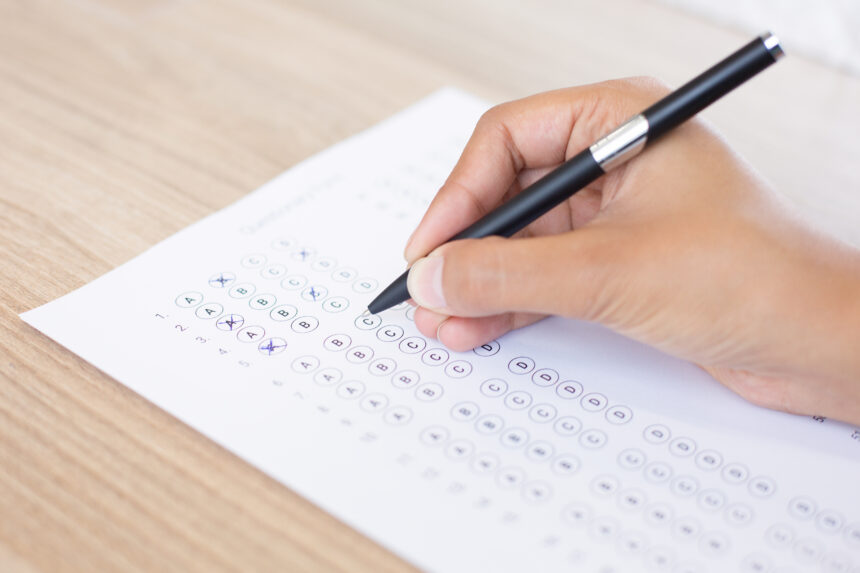Vidyarthi Vigyan Manthan (VVM) is a prestigious national-level science talent search examination conducted for students from classes 6 to 11. It aims to foster scientific temper and curiosity among young minds. To excel in VVM, you need more than just textbooks; you need hands-on practice and a deep understanding of science concepts.
Are you preparing for the VVM exam and wondering how to excel? One highly effective strategy is to incorporate mock tests into your preparation routine. In this article, we will explore the world of VVM mock tests, their significance, and how to use them to your advantage. So, let’s go right in.
Related: Australian Citizenship Test Questions and Answers PDF
- Sample VVM Mock Test Questions and Answers
- Importance of Mock Tests
- Preparing for VVM Mock Tests
- Taking VVM Mock Tests
- Benefits of VVM Mock Tests
- Common Challenges and How to Overcome Them
- Online vs. Offline Mock Tests
- Tips for Effective Mock Test Practice
- Using Mock Tests for VVM Preparation
- VVM Mock Test Resources
- Conclusion
- FAQs About VVM Mock Test Questions and Answers
Sample VVM Mock Test Questions and Answers
1. Question: What is the chemical symbol for silver?
Answer: Ag
2. Question: Who discovered penicillin?
Answer: Alexander Fleming
3. Question: What is the chemical formula for methane gas?
Answer: CH4
4. Question: Which planet is known as the “Red Planet”?
Answer: Mars
5. Question: What is the powerhouse of the cell?
Answer: Mitochondria
6. Question: Who proposed the theory of evolution by natural selection?
Answer: Charles Darwin
7. Question: What is the formula for the area of a circle?
Answer: πr² (pi times radius squared)
8. Question: Which gas do plants absorb during photosynthesis?
Answer: Carbon dioxide (CO2)
9. Question: What is the chemical symbol for calcium?
Answer: Ca
10. Question: What is the speed of light in a vacuum?
Answer: 299,792,458 meters per second
11. Question: Who is known as the “Father of Chemistry”?
Answer: Antoine Lavoisier
12. Question: What is the chemical formula for table salt?
Answer: NaCl (sodium chloride)
13. Question: What is the chemical symbol for hydrogen?
Answer: H
14. Question: Which gas do humans breathe out during respiration?
Answer: Carbon dioxide (CO2)
15. Question: What is the chemical formula for glucose?
Answer: C6H12O6
16. Question: Who formulated the laws of motion?
Answer: Sir Isaac Newton
17. Question: What is the SI unit of electric current?
Answer: Ampere (A)
18. Question: What is the chemical symbol for tin?
Answer: Sn
19. Question: What is the chemical formula for water?
Answer: H2O
20. Question: What is the chemical symbol for nitrogen?
Answer: N
21. Question: Who discovered the nucleus of an atom?
Answer: Ernest Rutherford
22. Question: What is the chemical formula for sulfuric acid?
Answer: H2SO4
23. Question: What is the chemical symbol for iron?
Answer: Fe
24. Question: What is the freezing point of water in Celsius?
Answer: 0°C
25. Question: Who developed the first successful polio vaccine?
Answer: Jonas Salk
26. Question: What is the chemical formula for ammonia?
Answer: NH3
27. Question: What is the chemical symbol for potassium?
Answer: K
28. Question: Who proposed the law of universal gravitation?
Answer: Sir Isaac Newton
29. Question: What is the chemical formula for carbon dioxide?
Answer: CO2
30. Question: What is the chemical symbol for gold?
Answer: Au
31. Question: Who is known as the “Father of Modern Physics”?
Answer: Albert Einstein
32. Question: What is the chemical formula for hydrogen peroxide?
Answer: H2O2
33. Question: What is the chemical symbol for copper?
Answer: Cu
34. Question: What is the chemical formula for nitric acid?
Answer: HNO3
35. Question: Who discovered radioactivity?
Answer: Marie Curie
36. Question: What is the chemical symbol for lead?
Answer: Pb
37. Question: What is the chemical formula for acetic acid?
Answer: CH3COOH
38. Question: What is the chemical symbol for mercury?
Answer: Hg
39. Question: Who proposed the theory of relativity?
Answer: Albert Einstein
40. Question: What is the chemical formula for aspirin?
Answer: C9H8O4
41. Question: What is the chemical symbol for uranium?
Answer: U
42. Question: Who discovered X-rays?
Answer: Wilhelm Conrad Roentgen
43. Question: What is the chemical formula for citric acid?
Answer: C6H8O7
44. Question: What is the chemical symbol for silver?
Answer: Ag
45. Question: Who is known as the “Father of Biology”?
Answer: Aristotle
46. Question: What is the chemical formula for vinegar?
Answer: CH3COOH
47. Question: What is the chemical symbol for iodine?
Answer: I
48. Question: Who formulated the periodic law?
Answer: Dmitri Mendeleev
49. Question: What is the chemical formula for hydrochloric acid?
Answer: HCl
50. Question: What is the chemical symbol for oxygen?
Answer: O
Importance of Mock Tests
Mock tests serve as invaluable tools in your VVM preparation arsenal. They offer a simulation of the actual exam environment, allowing you to get accustomed to the format, question types, and time constraints. But that’s not all; let’s delve deeper.
Preparing for VVM Mock Tests
Setting Clear Goals
Before you embark on your mock test journey, set clear goals for what you want to achieve. Determine your strengths and weaknesses in various science topics to create a focused study plan.
Gathering Study Materials
Ensure you have access to comprehensive study materials, including textbooks, reference books, and online resources. Having the right materials is vital for effective preparation.
Creating a Study Schedule
Develop a well-structured study schedule that allocates specific time slots for mock tests, review, and revision. A disciplined approach is key to success.
Taking VVM Mock Tests
Simulating Exam Conditions
When taking mock tests, simulate the actual exam conditions as closely as possible. Find a quiet space, set a timer, and attempt the test without distractions.
Managing Time Effectively
Time management is critical in VVM. Learn to allocate time wisely to different sections and questions, ensuring you complete the paper within the stipulated time.
Analyzing Results
After each mock test, analyze your performance meticulously. Identify areas where you excelled and where improvement is needed. This analysis guides your further study efforts.
Benefits of VVM Mock Tests
Mock tests offer numerous advantages. They boost your confidence, reduce anxiety, and help you understand the question patterns. Additionally, they enhance your problem-solving skills and time management abilities.
Common Challenges and How to Overcome Them
Test Anxiety
Feeling nervous before a mock test is natural. To overcome test anxiety, practice relaxation techniques like deep breathing and positive visualization.
Lack of Confidence
If you lack confidence, remember that mock tests are a safe space to make mistakes. Focus on improvement rather than perfection.
Difficulty in Time Management
If time management is a challenge, practice with a timer during your mock tests. Gradually, you’ll become more efficient.
Online vs. Offline Mock Tests
Both online and offline mock tests have their merits. Online tests offer convenience, while offline tests mimic the traditional paper-and-pencil format. Choose the mode that suits you best.
Tips for Effective Mock Test Practice
Reviewing Mistakes
Don’t just take mock tests; learn from them. Analyze your mistakes, understand why you made them, and avoid repeating them in the actual exam.
Staying Consistent
Consistency is key in VVM preparation. Make mock tests a regular part of your routine to maintain a steady learning curve.
Seeking Guidance
If you’re struggling with specific topics, don’t hesitate to seek guidance from teachers or peers. Clarifying doubts will enhance your understanding.
Using Mock Tests for VVM Preparation
Mock Test Frequency
Determine how often you’ll take mock tests based on your study plan. Regular practice is essential, but avoid overburdening yourself.
Monitoring Progress
Keep track of your progress by maintaining a record of mock test scores and improvements. This helps you stay motivated and focused.
VVM Mock Test Resources
Explore various resources, including websites, mobile apps, books, and practice papers, to access a wide range of mock tests.
Conclusion
Incorporating VVM mock tests into your preparation strategy can make a world of difference in your performance. By setting clear goals, managing time effectively, and learning from your mistakes, you can enhance your chances of acing the VVM exam. Start your mock test journey today and watch your confidence and knowledge soar.
Related: Florida Driving Test Questions and Answers PDF
FAQs About VVM Mock Test Questions and Answers
- Are VVM mock tests similar to the actual exam?
- Mock tests aim to replicate the exam format, but the actual questions may vary. Nevertheless, they provide valuable practice.
- How many mock tests should I take before the VVM exam?
- The number of mock tests you take depends on your study plan. Aim for consistent practice without overwhelming yourself.
- Can I take VVM mock tests online?
- Yes, there are online platforms that offer VVM mock tests for your convenience.
- What if I perform poorly in mock tests?
- Mock tests are meant for learning and improvement. Identify your weak areas and work on them to enhance your performance.
- Is seeking guidance from teachers important for VVM preparation?
- Yes, teachers can provide valuable insights and clarify doubts, making your preparation more effective.
- How can I stay motivated during VVM preparation?
- Reading success stories and setting achievable goals can help you stay motivated throughout your preparation journey.
- Is it necessary to take both online and offline mock tests?
- It’s not necessary, but trying both can help you adapt to different testing environments.
- Can I use mobile apps for VVM mock tests?
- Yes, many mobile apps offer VVM mock tests that you can use on-the-go.
- What is the ideal duration for a VVM mock test session?
- Aim for a duration that matches the actual exam time to practice time management effectively.
- Are there any specific tips for improving time management in VVM mock tests?
- Practice with a timer and allocate a fixed time to each section to improve time management skills.





